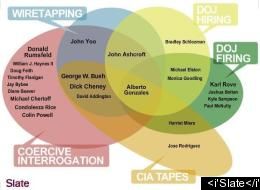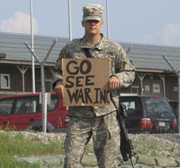 Today, the Pentagon announced that American troops had killed Abu Qaswarah, the No. 2 leader of al Qaeda in Iraq, in a raid in Mosul. U.S. military officials hailed the death of Qaswarah, also known as Abu Sara, as “a major disruption to the terror network, particularly in northern Iraq,” according to the AP.
Today, the Pentagon announced that American troops had killed Abu Qaswarah, the No. 2 leader of al Qaeda in Iraq, in a raid in Mosul. U.S. military officials hailed the death of Qaswarah, also known as Abu Sara, as “a major disruption to the terror network, particularly in northern Iraq,” according to the AP.
However, this is at least the third time that U.S. officials have announced the capture/killing of a “No. 2″ leader of al Qaeda in Iraq in the past few years. On each occasion — including when they killed the No. 1 leader — they similarly hailed it as a major victory:
Al Qaeda continues to remain resilient in the face of these attacks from the U.S. military, who are trying to undo a situation created by Bush’s invasion. No matter how many times troops kill top leaders, new ones emerge, because the insurgency continues to be, in part, fueled by the U.S. occupation. As counterterrorism analyst Evan Kohlmann said in 2005, “If I had a nickel for every No. 2 and Nov. 3 they’ve arrested or killed in Iraq and Afghanistan, I’d be a millionaire.” (Think Progress, "For at least the Third Time, Officials Take down a 'No. 2' leader of Al Qaeda in Iraq," 15 October 2008)Sept. 2005: U.S. and Iraqi officials announce that they killed al Qaeda in Iraq’s No. 2 leader — Abdallah Najim Abdallah Mohammed al-Juwari, known as Abu Azzam. A spokesman for Prime Minister Ibrahim al-Jaafari said that Azzam’s death was a “painful blow” to al Qaeda.
June 2006: U.S. and Iraqi officials announce that they have killed Abu Musab al-Zarqawi, the No. 1 leader of al Qaeda in Iraq. President Bush called his death a “severe blow” to the terrorist group.
Sept. 2006: Iraqi authorities capture Hamed Jumaa Farid al-Saeedi, known as Abu Humam or Abu Rana, al Qaeda in Iraq’s No. 2 leader. Iraqi national security adviser Mouwafak al-Rubaie said that the arrest left the terrorist organization suffering a “serious leadership crisis.” “Our troops have dealt fatal and painful blows to this organization,” he added.



















